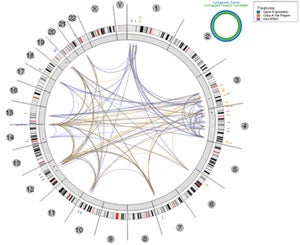Genome Research

With the sequencing of the human genome and availability of high power computational methods and various high throughput technologies, biomedical research is poised to undergo revolutionary change. As a result of these developments and emerging technologies, genome research continues to evolve as a field that develops novel insights into the genome biology of all organisms, including significant advances in genomic medicine. The field comprises of developments in cutting-edge computational biology and high-throughput methodologies. Faculty and staff members of ICBI engage in genome research on critical projects involving breast, pancreatic and colorectal cancers as well as neurobiology and pediatric diseases. Our efforts in genome research include:
- Determining the function of genes and the elements that regulate genes throughout the genome by utilizing systems biology techniques
- Finding variations in the DNA sequence among people and determining their significance and associations to various genetic and non-genetic diseases. The most common type of genetic variation is known as a single nucleotide polymorphism or SNP (pronounced “snip”). These small differences may help predict a person’s risk of particular diseases and response to certain medications (field known as Pharmacogenomics)
- Developing and applying genome-based computational strategies for the early detection, diagnosis, and treatment of disease
- Understanding the 3-dimensional structures of proteins and identify their functions in the context of genome variations as related to drug response or disease causation
- Developing new infrastructure to store genomic data efficiently
- Explore the ethical, legal, and social issues raised by genomic research
